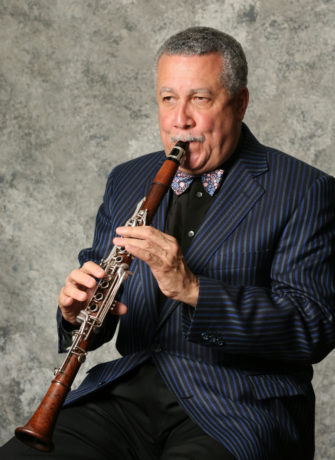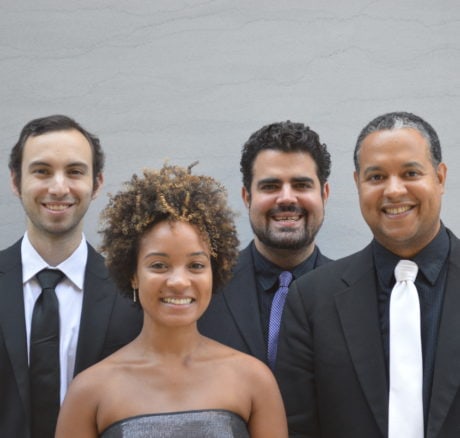For decades, the Sunday afternoon concert series at the Phillips Collection has maintained primacy of place in Washington’s classical musical firmament. But like leaders in all fields who want to maintain their position, the series has to stay ahead of the curve by evolving along with the times.

That was very much the idea behind the series’ distinctive opening concert this season, a jazz/classical crossover program featuring the Harlem Quartet and Latin jazz clarinetist Paquito D’Rivera. The Harlem Quartet is a traditional string quartet that delves across genres from classical and contemporary art music to jazz and pop.
Especially inspiring was the determination of the five performers to avoid going in a predictable straight line through musical history. Instead they set a consistent vibe while zigzagging across 200 years of composition history for the sold-out audience in the Phillips Collection’s historically significant and recently renovated Music Room.
The music of living American composer and pianist William Bolcom made an ideal choice to lead off the afternoon. Bolcom is technically a “classical” composer but his pieces are often shot through with folk, jazz, and even bluegrass overtones. The Harlem Quartet opened with the first of Bolcom’s Three Rags for string quartet, a bouncy and angular number he titled “Poltergeist.”
The number at first seems to truck along in a straightforward fashion. But at various points the interior lines of the quartet – second violinist Melissa White and violist Jaime Amador – would hive off into jagged counter-melodies that seemed to go comically off-kilter into adjacent keys before rejoining the group. The effect was like a child or pet on a family’s walk in the woods venturing off the path but then finding its way, or perhaps being pulled back, to the straight line.
Moving back into the late 19th century, the quartet played a single, quick-silver movement of a full-length quartet by Claude Debussy before going back all the way to 1815 for a full, four-movement composition by German composer Carl Maria von Weber, joined for the first time by D’Rivera on the clarinet.

In this straightforwardly classical “Clarinet Quintet,” D’Rivera’s tone at high pitches was a bit less round and more biting than purely classical clarinetists would deliver in the same music. The difference was noticeable simply because Weber’s clarinet quintet itself is so sunny and warm. Rapid upward leaps abound in a minuet movement, and the so-called “slow” movement is actually a melodic Fantasia that acts more or less as a concert aria for the clarinet, much as an operatic soprano or tenor would take the stage to show off in the middle of an act.
Plenty of virtuosic material remained in a final, fun movement that alternated a galloping rhythm with call-and-response melodies traded between the clarinet and, in rotation, one or another of the string players.
For some attendees who had clearly come specifically to see D’Rivera, the main event was his own original compositions, starting with two entries from his Suite Aires Tropicales composed in 1994. A good deal of contrast was packed between the two selections. In the first, called “Alborada y son,” the clarinet, after a complex interplay with the rest of the group, frequently settles into the middle of a five-note chord with the four string instruments, creating a striking and particularly glowing timbre. The other selection, “Contradanza,” is very different, with the string quartet ironically taking the role of a dance band and the clarinet essentially the singer-soloist – at least for a while until the string instruments themselves bust out into their own limelights.
Since the idea of a “contradance” or country dance reaches back to the 17th and 18th centuries in England, France, and what was to become the United States, this connection between “classical” and “popular” music was particularly apt for the concert and shows D’Rivera’s particular range as a composer.
Distinctive compositions with names like A Farewell Mambo and Invitación al Danzón – a Spanish takeoff on Carl Maria von Weber’s recognizable tune titled Invitation to the Dance – led to a virtuoso conclusion to the concert by the five musicians with a piece by D’Rivera entitled La Fleur de Cayenne.
It’s a tour de force with a teasing introduction that D’Rivera has arranged in a number of forms. The soloist can be a clarinet, flute, violin or something else, and the “accompaniment” anything from a string quartet to a jazz band. But it manages to sound “big” in any arrangement, including the one at the Phillips with D’Rivera’s own instrument as the soloist and a particularly hearty string quartet along for the ride. Maybe sometime soon in Washington, another concert producer can present the same piece’s big-band arrangement with D’Rivera as featured soloist.
Performers at the Phillips are generally free to set their own atmosphere, from formal classical recital to abundant audience interaction. D’Rivera’s almost corny sense of humor ran like a thread through the spaces between the music. At one point he said it was a myth that he was originally from Cuba because he’s really from Yugoslavia, and at another point, he claimed that Yo-Yo Ma’s real name is Yo-Yo Martinez. (I know, you had to be there.)
And I’ve seen a lot of things happen in the fraught moments of supposedly required silence between movements of a classical sonata, but never this: Right at the end of one of the movements of Weber’s Clarinet Quintet, exactly on what would have been the next beat of music, somebody in the audience sneezed. On what would have been the next beat after that, the response rang out from D’Rivera: “Bless you!” Perfect.
Paquito D’Rivera and the Harlem Quartet performed on Sunday, October 13, 2019, at 4 p.m. at the Phillips Collection, 1600 21st Street NW, Washington, DC. For the full season schedule of Sunday afternoon concerts at the Phillips Collection, see the Phillips Music website.




